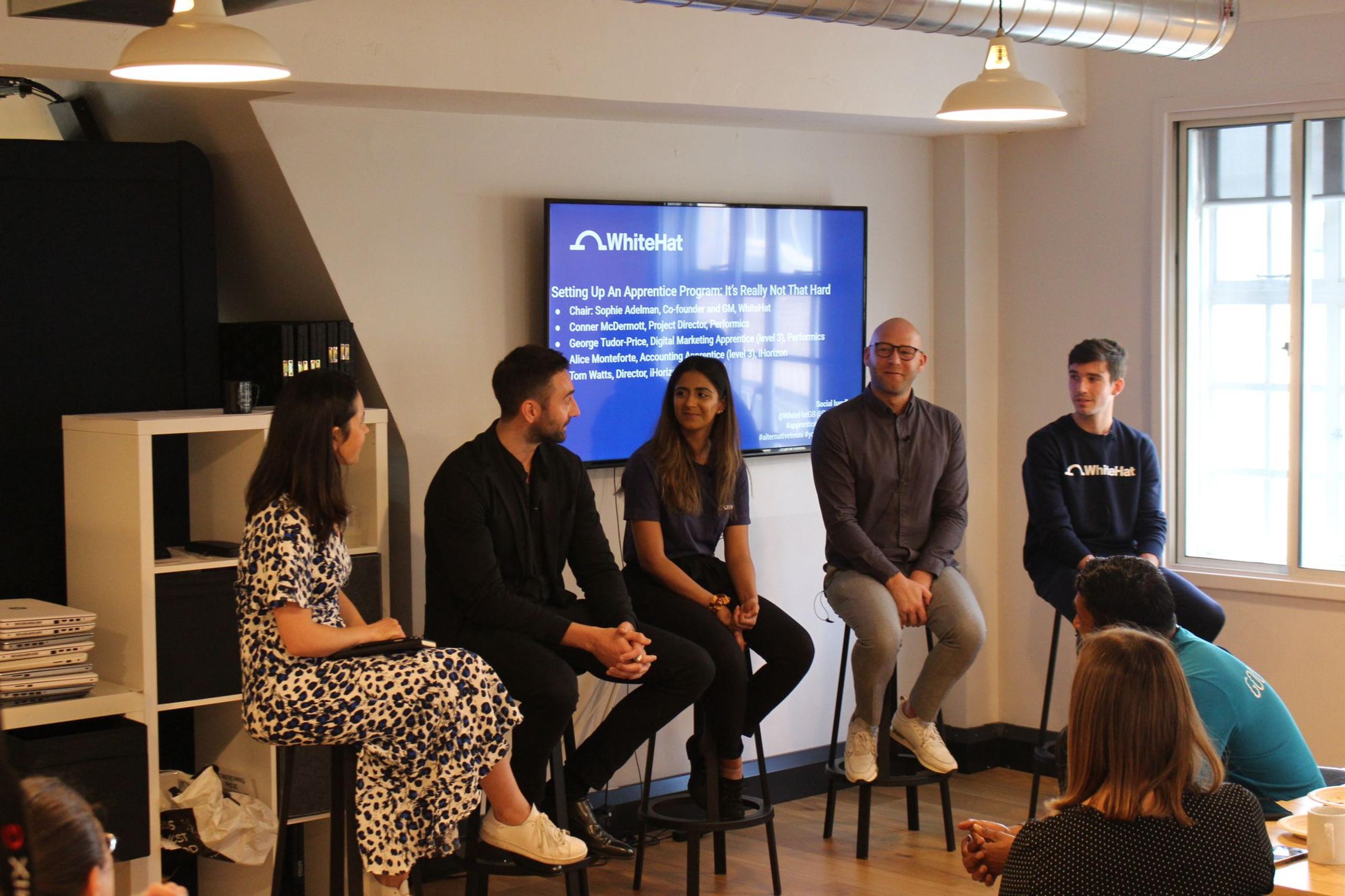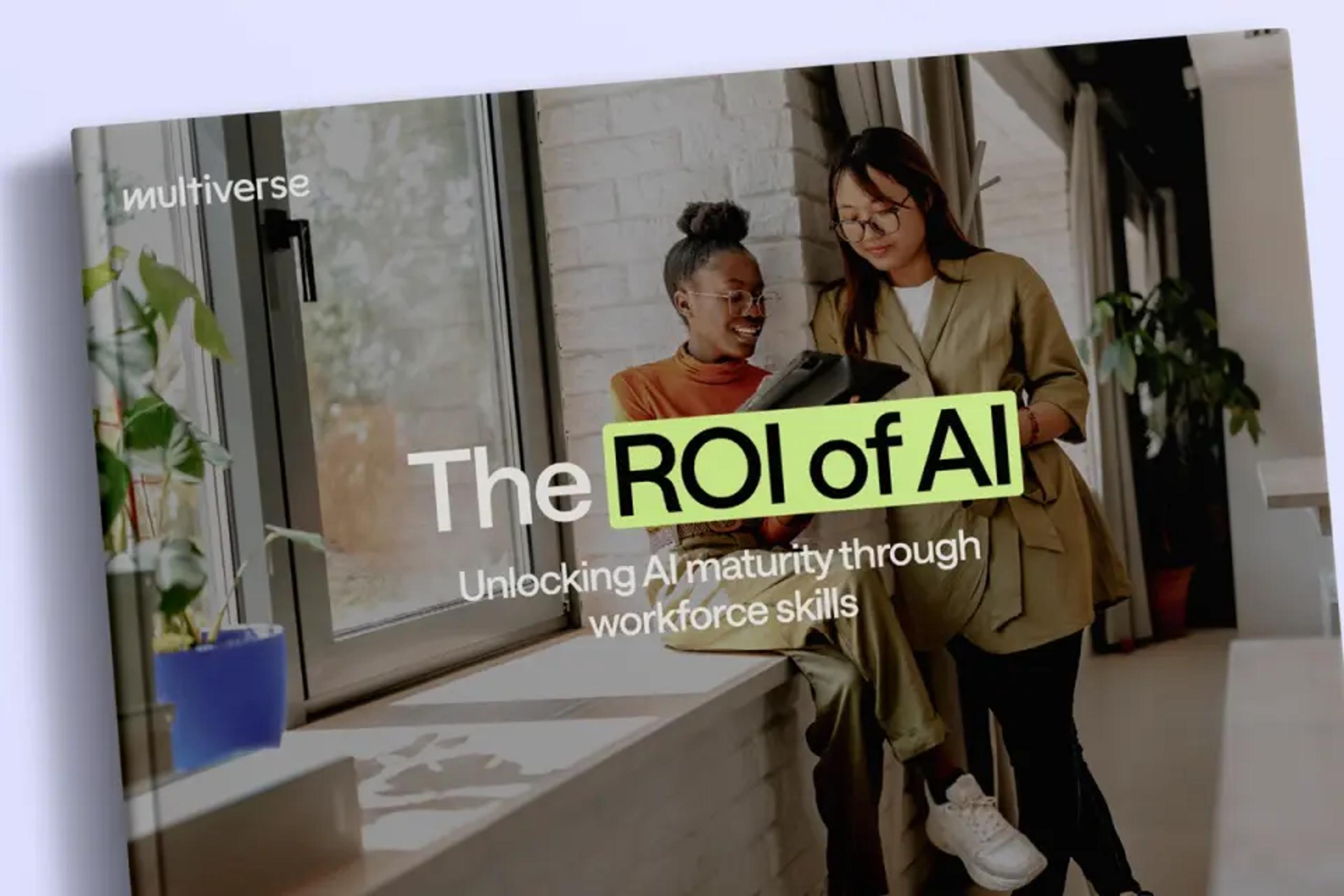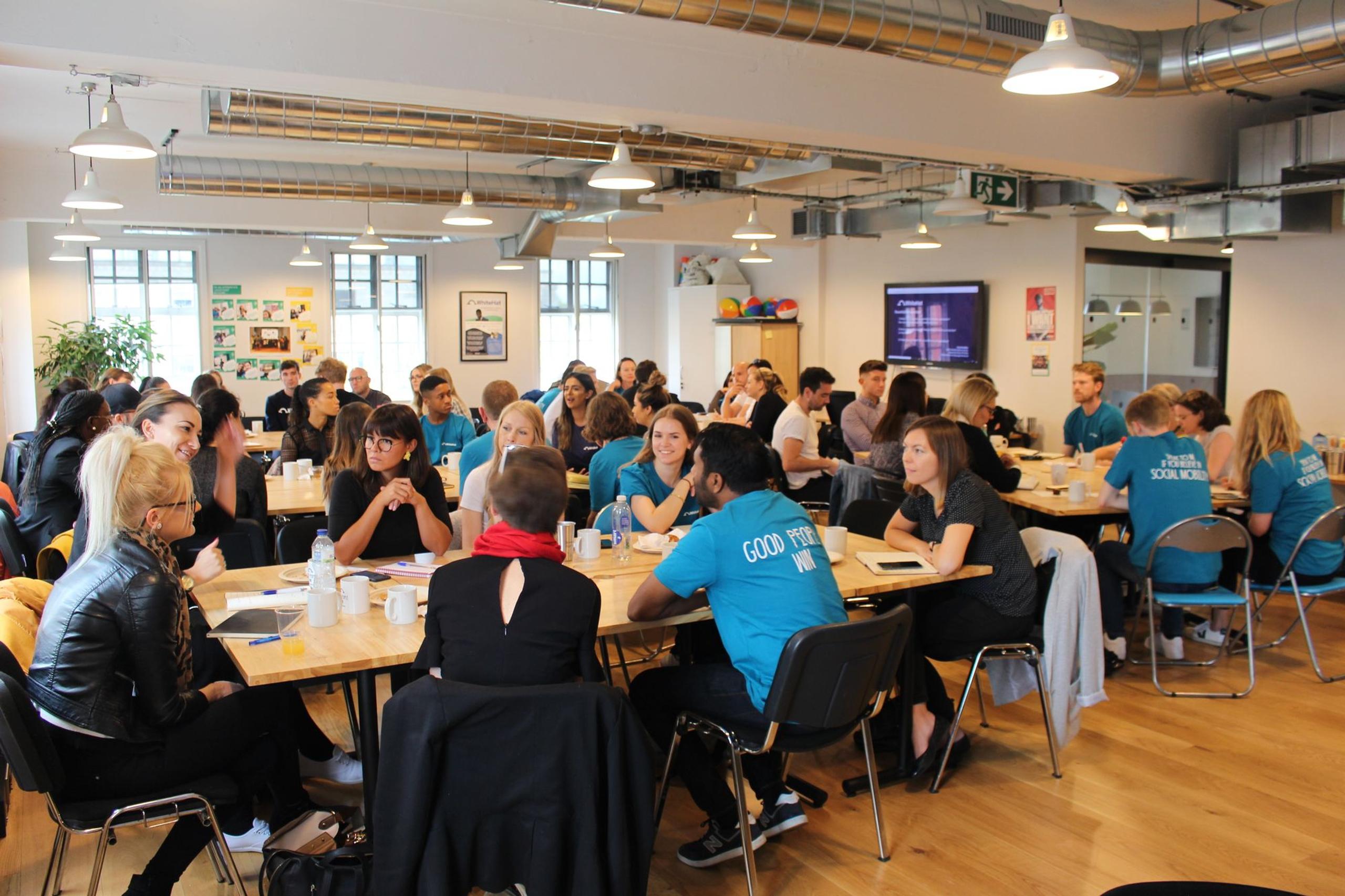WhiteHat and The Recruitment Events Company co-hosted a breakfast event exploring misconceptions around apprentices and how companies can implement a successful apprenticeship program. The room was packed with HR, recruitment and talent representatives seeking practical tips on how to launch an apprenticeship programme.
On Thursday morning, representatives from a number of companies, including Expedia, allplants and GoCardless, gathered in the WhiteHat offices to hear from a selective panel of WhiteHat apprentices and their line managers. A few had existing apprenticeship programmes, and the majority were levy payers, but everyone was interested in finding out about our panellists first-hand experiences.
Sophie Adelman, co-founder of WhiteHat, chaired the panel and was joined by Conner McDermott, Project Director & George Tudor-Price, Digital Marketing Apprentice from Publicis and Tom Watts, Director & Keyuri Dattani, Accounting Apprentice from iHorizon.

Apprenticeships: changing perceptions
To open the panel, Sophie asked George and Keyuri what had got them onto this alternative path. Both very open, they discussed how they had chosen to go to university as, like many young people, they had felt pressure to go as it had seemed to be the only route to getting a good career and succeeding in the future. As it was, they both dropped out after 3 months. They mulled over the difficulties they faced, the courage it took to drop out and how it wasn’t easy for their families to accept.
Today, George and Keyuri are WhiteHat Hacktivists. Forming part of the leadership team, they are huge advocates of WhiteHat, and take part in a number of different events and school visits to spread the word about apprenticeships to young people.
Graduates versus apprentices
The discussion turned to graduates versus apprentices, and how both were routes to bring in young, hungry talent that you can develop. Conner and Tom recognised that there was little difference in terms of ability, but highlighted differences within life experience, and how apprentices often seemed more appreciative of the investment being made in them by their employer.
Conner told the audience that Publicis has both a graduate scheme and an apprenticeship scheme in place but, because of a higher drop out rate on the graduate side, is starting to push for apprentices to fill all executive roles.He also reflected on the fact that, because they were on the same scheme, eventually the apprentices would be promoted and end up managing young graduates who are the same age as them.
Getting internal buy-in
Many of our guests mentioned experiencing difficulty when trying to get internal buy-in, especially when trying to get line managers onboard. Conner explained, “to choose the person who is going to manage an apprentice, I look at the people who are already exceeding in their role and present it as a career development opportunity for them”.
Sophie added “it is really important to make sure line managers are engaged and bought in, as well as to give them an onboarding similar to the apprentice’s. It’s crucial that line managers receive the training, support and guidance to ensure everyone knows what is expected of them and to make the programme a success.’
And Tom finished up with, “get your line managers to champion apprenticeships! Let them explain to the wider team why they think mentoring an apprentice will benefit all parties.”
Ensuring success at your assessment day
Assessment days are often the first real interview school-leaver candidates encounter, so it can be daunting for some of them. Keyuri’s top tip was to make it conversational and use it as an opportunity to learn more about their personality, whilst another of our panellists suggested making sure the assessment day reflects your company culture and is a day that young people will remember.
Conner told the audience how, at Publicis, they had loved the WhiteHat candidates so much that they created additional roles!
Understanding 20% off-the-job training
The panel finished up by discussing the 20% off-the-job requirement. A number of apprenticeship providers work along a “4 days in the office, Friday working on your off-the-job training” model which often puts employers off. George explains, “20% off-the-job training can be done whenever during the week, not just on Friday, and it can be really flexible. For example, if I spend 30 minutes working on my portfolio or work on tasks for other teams - that counts!”

Following the panel session, delegates split into roundtables and enjoyed the opportunity to ask questions and discuss the obstacles they face internally, benefiting from hearing from each other’s experiences.
Here are the key takeaways:
1. Make sure the line manager is committed to making it work, and understands what is expected of them through expectation setting.
2. Present apprenticeships as a development opportunity to line managers.
3. Implementing the right process will take time but learn from the experience of your line manager and apprentice.
4. Accept that there will be a trial and error phase, and use it to change and adapt the structure of the program according to the results.
5. 20% off-the-job training can be made to work for you and your role. Apprentices usually stay at a company for longer than graduates as they appreciate the investment you are making in them.
6. Apprenticeships aren’t only for school-leavers, they can be used to upskill your current employees.
7. As a line manager, don’t be afraid to challenge your apprentice to discover their full potential. You might be (pleasantly) surprised!
8. And finally, setting up an apprentice program, it really isn’t that difficult!
Last words from our panellists…
George Tudor-Price, Digital Marketing Apprentice, Publicis
”Don’t be afraid to set your apprentice important and challenging tasks, you could be really surprised by the value they can bring to your company.
Tom Watts, Director, iHorizon
“First, work with chosen line managers who are 100% committed to taking part in the hiring process, prepare the onboarding, share valuable skills & support the apprentice throughout the whole experience. Then, champion line managers to promote the benefits of having an apprentice to the rest of the employees. ”
Keyuri Dattani, Accounting Apprentice, iHorizon.
“There is a lot of stigma around apprentices but it’s important to look beyond those and focus on their amazing personalities as well as not underestimating their capability. It’s essential to remember that for most of them, it will be their office job, so they will probably need an adjustment period. WhiteHat induction days, are set up to ensure the apprentices know exactly what is expected from them on both training provider & employer side.




